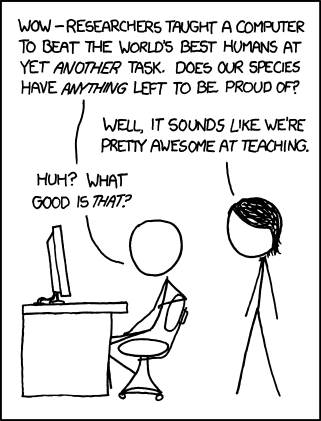In 1996 the computer Deep Blue played its first match against the chess Grand Master and reigning world champion Kasparov and won. This prompted a flurry of articles about man against the machine and set the concern that the machine would eventually win in most endeavors and challenges against man.
Today’s cartoon from XKCD continues this trend (albeit tongue very firmly in cheek):

However, there is an easily overlooked flaw in this argumentation. The machine is not an independent being. The machine has no will. The machine is a representation of the intelligence and thought of a large group of programmers and developers. It was not the machine Deep Blue that beat Kasparov – it was the whole team of developers.
This is not a criticism of the machine but rather a criticism against the over-enthusiasm of the ability of the potential of the machine and the dream/nightmare of the technological singularity – the point where the age of human dominance will come to an end. This concept has been popularized by Vernor Vinge in his 1993 article The Coming Technological Singularity: How to Survive in the Post-Human Era which contains the black vision that: “Within thirty years, we will have the technological means to create superhuman intelligence. Shortly after, the human era will be ended.”
This is all very cool if you are thinking about entertaining science fiction but to make it work in reality, it requires that we ignore the teams of developers and handlers which make the technology work. As an antidote to the black vision I highly recommend Jaron Lanier’s (2010) book You Are Not a Gadget when expands and criticizes the ideas of collective intelligence.